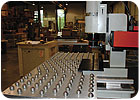
Rollover accidents with Humvees are a common problem in Iraq and Afghanistan. The heavily loaded vehicles can be sent into a roll during evasive maneuvering, off-road travel, bomb blasts and insurgent attacks. From March 2003 to August 2007, 77 soldiers lost their lives in rollovers.
A quick means of escaping an overturned Humvee often means the difference between life and death. Unfortunately, it’s not so easy to evacuate an overturned Humvee. When fully armored, the vehicle’s doors can weigh as much as 800 pounds each, making them virtually impossible to open if the vehicle is not upright.
To solve this problem, Ibis Tek LLC (Butler, PA), a manufacturer of ballistic glass assemblies and accessories for military and personal security vehicles, developed what it calls its Vehicle Emergency Escape (VEE) window. Each window consists of bullet-resistant glass sandwiched in an armored frame, approximately 14 inches high and 28 inches wide. On each side of the window is a pair of safety pins and handles, which allow a soldier to quickly push the window out of the way. With a VEE installed in the front of the vehicle, a Humvee crew can escape in a minute or less.
So impressed was the Army with the windows that it decided to retrofit them to Humvees in the field, as well as integrate them into newly built vehicles. Suddenly, Ibis Tek found itself in a position where it had to ramp up production very quickly.
However, as it was doing so, the company discovered a problem with the way it was installing the 25 hardened steel rivets that hold together the glass and armor frame. Specifically, the company found that its traditional riveting techniques couldn’t accommodate the hardness of the rivet material and were causing smearing and cracking of the metal. To solve the problem, the company implemented a radial riveting system from BalTec Corp. (Canonsburg, PA), which proved gentle enough to create a joint that was not only strong, but also aesthetically pleasing.
Radial riveting is a cold-forming process with no impact between the forming tool, or peen, and the rivet. Instead, the tool presses down on the rivet while traveling back and forth through the axis of the fastener, passing over the end of the rivet shank on a path that is an 11-loop rosette. The angle between the tool axis and the spindle axis varies continuously between 0 and 6 degrees. As the tool presses against the rivet shank, the rivet material spreads radially outward and inward along the overlapping loops of the rosette pattern to form the desired shape.
To accommodate Ibis Tek’s production needs, BalTec built a semiautomatic workcell in which an operator assembles the components on a roller table and then positions each rivet between the riveting head and the anvil. A laser helps the operator align the riveting locations with the tooling. The system includes a foot pedal, which is used to initiate the actual riveting. Future plans call for the process to be fully automated through the use of robotics.
Because of the critical nature of the assembly, and because the rivets are longer and harder than those that might be used in a civilian application, the riveter is equipped with BalTec’s STF process monitoring system. This system provides real-time information on how much force is being applied to the part, how far the forming head is traveling, and how much time is being used to form the head. The machine monitors these variables continuously and compares them against data for known good assemblies, a technique called signature analysis.
This makes it possible to quickly weed out defective assemblies. It also allows the riveter to compensate for slight variations in the parts and still ensure a sound assembly. For example, if a rivet is not perfectly on center, the system can automatically adjust the forming process to compensate for the variation without requiring the operator to intervene.
For more information on radial riveting equipment, call BalTec at 724-873-5757 or visitwww.baltecorporation.com.